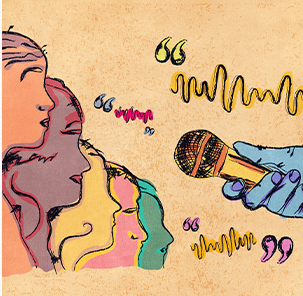Subscribe and receive the best Inkyfada podcasts straight to your mailbox.
Don't miss out! Subscribe to our newsletter to receive the latest Inkyfada podcasts.
Thanks for your inscription
Unsubscribe at any time

In this third episode of inkytalk, we look back at decree-law 88 from 2011 concerning the organisation of associations, analysing the guarantees that this text provides and the control mechanisms that are already in place.
In this discussion, our guests read the current legislative framework, and discuss the practices of the administration over the past 10 years, the threats that the new bill represents in this exceptional framework, and the question of foreign funding that demonises civil society in the narrative of President Kais Saied.
Guests:
Oumayma Mehdi, Researcher at Legal Agenda
Salma Jrad, Executive Director of Al Bawsala
Charfeddine Yacoubi, president of the association Onshor
Malek Khadhraoui, Executive Director of Inkyfada
Moderator: Emna Chebaane, Editorial Director of Inkyfada
Inkyfada Podcast is the first platform entirely dedicated to original Tunisian podcasts, and was conceived by Inkyfada media in collaboration with the in-house research and development laboratory, InkyLab. Inkyfada joined the global podcast boom in 2017, when the team produced the first Tunisian audio documentary, diving deep into the belly of the El Kamour struggle taking place in the desert. Since then, Inkyfada Podcast has produced a wide variety of documentaries, investigations, and podcast series, as well as articles accompanied by music; covering a multitude of contemporary issues in order to offer an immersive and alternative podcast experience. Whilst exclusively offering audio content, the Inkyfada Podcast team upholds the same core values and principles of inkyfada.com, and is committed to producing high quality content though a dynamic and meticulous production process. In addition to the permanent team, Inkyfada podcast works closely with various journalists, artists, illustrators, musicians and other content creators in order to diversify the platform and support artistic creativity. These podcasts differ from traditional radiophonic content in that the applied production and editing process is more akin to cinematographic techniques, in addition to being web-based, downloadable and accessible on demand. Additionally, Inkyfada Podcast uniquely offers subtitles in French, Arabic and English for all audio content, the majority of which is recorded in Tunisian or in the preferred language of the speaker in question.